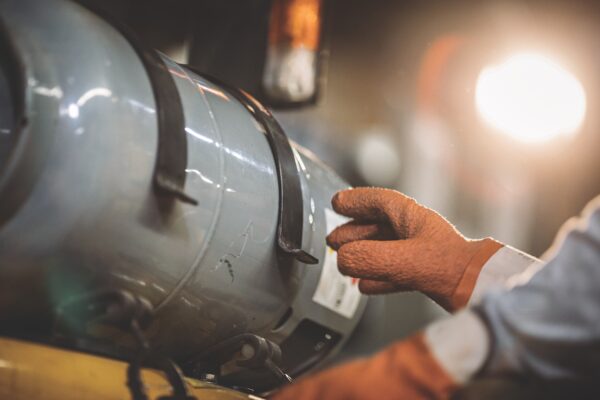Forklifts are an everyday essential in material handling operations, which is why forklift safety is a top priority in the industry. Ninety percent of Class 4 and 5 forklifts are powered by propane, which is why proper propane safety practices are an important priority for crews across the country. With safety top of mind this June, below are some of the top tips for operators, floor workers, and truck drivers alike to stay safe around forklifts.
Universal Forklift Safety Tips
- Complete routine checks of equipment before operating and notify management of damages or problems.
- Wear proper PPE such as hard hats, protective footwear, eyewear, and high-visibility clothing on the warehouse floor and while operating a forklift.
- Buckle up every time. This may seem obvious, but it’s an essential tip to remember. Overturned forklifts are a leading cause of forklift-related accidents.
- Move slowly and use the horn. Collisions could happen when vision is obstructed. Using the horn at every intersection will keep pedestrians and other operators safe.
- Know your forklift’s weight capacity and adhere to it. Exceeding the weight capacity of a forklift significantly increases the risk of tipping and injury.
- Lower, park, and set. Always lower the forks, use the parking brake, and set the controls to neutral when finished operating a forklift. Safely parking the machine reduces the risk of unintended movement and injury. Use wheel blocks to secure the forklift further, especially if parking on an incline.
- Mind the ramp. Drivers should always carry a load pointing up an incline with their heads pointed in the direction they are going. If unloaded, keep the forks pointed downgrade.
- Inspect forklift fleets regularly. Regular maintenance helps prevent unnecessary damage to the equipment and keeps employees safe.
- Keep forklifts clean and free from excess oil and grease.
Propane Forklift Safety Tips
- Inspect propane cylinders before operation. Check cylinders for rusting, dents, gouges, and leaks. Cylinders that show signs of wear or leaks shouldn’t be used and may need to be replaced, even if within the cylinder’s requalification date.
- Use proper lift techniques to place a cylinder onto a forklift and wear protective gloves. Carefully place the cylinder into the cradle so the cylinder pin enters the locating hole in the cylinder collar. Once properly situated, secure the cylinder by tightening the brackets and check for leaks using a leak detection solution.
- Secure the pressure relief valve on the cylinder. Before connecting, confirm the cylinder valve is closed. Once placed in the cradle, operators should check that the pressure relief valve fitting is roughly 180 degrees from the forklift’s locating pin.
- Firmly tighten the gas line to the service connection.
- Close the service valves on cylinders when not in use. This helps prevent potential injury around internal combustion engines and unintended fuel loss.
- Store propane cylinders in a secure rack or cage. The cylinders should be stored horizontally with the pressure relief valves in the uppermost position, and operators should use proper lifting techniques when removing cylinders from storage and placing them onto a forklift.
- Propane cylinder storage racks must be located at a safe distance from heat or ignition sources, protected from the elements, and kept away from stairwells and high-traffic areas.
Warehouses, factory floors, and distribution centers have many moving parts as well as people coming and going. With proper signage, training, and storage, propane is a safe energy source to power forklifts year-round, both indoors and out. Remember to regularly review safety measures with forklift operators and workers not just during the month of June, but every day.
To learn more about propane forklifts, visit Propane.com/forklifts.
About the Author:
Gavin Hale is the Vice President of Business Development of the Propane Education and Research Council. The Propane Education & Research Council is a nonprofit that provides leading propane safety and training programs and invests in research and development of new propane-powered technologies. PERC is operated and funded by the propane industry. PERC programs benefit a variety of markets including transportation, agriculture, commercial landscaping, residential, and commercial building.











